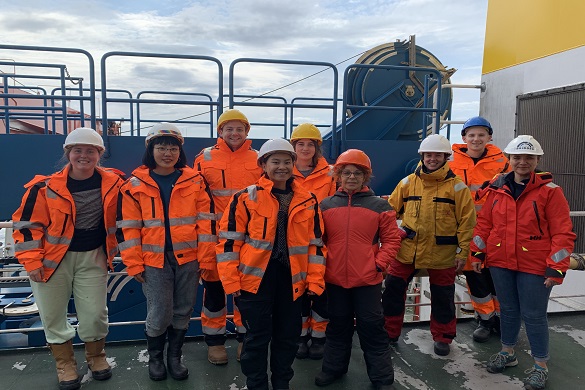
Ocean scientists from the School of Environmental Sciences are embarking on a research expedition to investigate the effects of rapid warming and sea ice loss on nutrient sources in the Arctic ocean.
Professor Claire Mahaffey is the Principal Investigator on the five week expedition that will look to see if microbes typically associated with warmer waters are now present in the cold polar waters.
The expedition onboard the RRS Discovery involves scientists from the University of Southampton and National Oceanography Centre alongside international collaborators from Duke University, University of California, Santa Cruz and Mediterranean Institute of Oceanography.
The team will study the distribution, abundance and activity of nitrogen fixing organisms in the Barents Sea in the eastern Arctic Ocean.
It also includes two University of Liverpool undergraduate students from the Department of Earth, Ocean and Ecological Sciences who will be analysing samples onboard the ship.
The Arctic is warming at an unprecedented rate, four times faster than the rest of the planet. This warming is driving a decline in the area and thickness of sea ice, with knock-on effects for ocean circulation and biological productivity.
A major consequence of this rapid change is the decline in nutrients, which are vital for fuelling biological productivity which underpins the entire Arctic ecosystem. A decade ago, numerical models predicted a decline in nutrients in the Arctic, but time-series observations now support this prediction This has led to scientists to wonder if the Arctic Ocean run out of nutrients in the future.
In the warm tropical ocean, where nutrients concentrations are chronically low, nitrogen is supplied by a biological process known as nitrogen fixation, which is performed by organisms known as diazotrophs. Nitrogen fixers support the ecosystem by supplying nitrogen and fuelling productivity.
For decades, this process has been assumed to be constrained to warm tropical waters. Recently, scientists have discovered the presence of diazotrophs in the colder Arctic Ocean but observations are sparse, mostly focused on the Pacific sector of the Arctic and there is no information on the factors that control their distribution or activity in cold waters.
Professor Claire Mahaffey said: “This project began in 2019 but fieldwork was delayed due to the pandemic. We are excited to finally sail to the Arctic Ocean and discover how important these organisms are to supplying nitrogen in these cold polar waters, and therefore supporting the unique Arctic ecosystem now and in the future.
“If activity is high and their contribution to nutrient supply is significant, we will need to completely alter our view on nutrient supply to the Arctic, but also revisit the local and global importance of marine nitrogen fixation.
“We will be collecting an immense amount of data during the cruise, using both traditional and new technologies. Led by Professor Dani Arribas-Bel, from the University’s Department of Geography & Planning and Geographic Data Science Laboratory, we will apply the latest approaches in data analysis, including machine learning, to this environmental data set, to develop algorithms on cold water biological processes for use in global numerical models.”
The RRS Discovery set sail from Southampton on 9th July and the expedition will last five weeks.
The expedition is supported by NERC. Follow @ProfCMahaffey on twitter for updates on the expedition.
Image (from left to right): Millie Goddard-Dwyer (PhD student, University of Liverpool), Xin Meng (PhD student, University of Liverpool), Lewis Wrightson (PDRA, University of Liverpool), Thanh-Ngan Hua (UG student, University of Liverpool), Catherine Berridge (UG student, University of Liverpool), Louisa Norman (technician, University of Liverpool), Professor Claire Mahaffey (University of Liverpool), Ben Fisher (PhD student, University of Edinburgh), Mar Benavides (Mediterranean Institute of Oceanography).